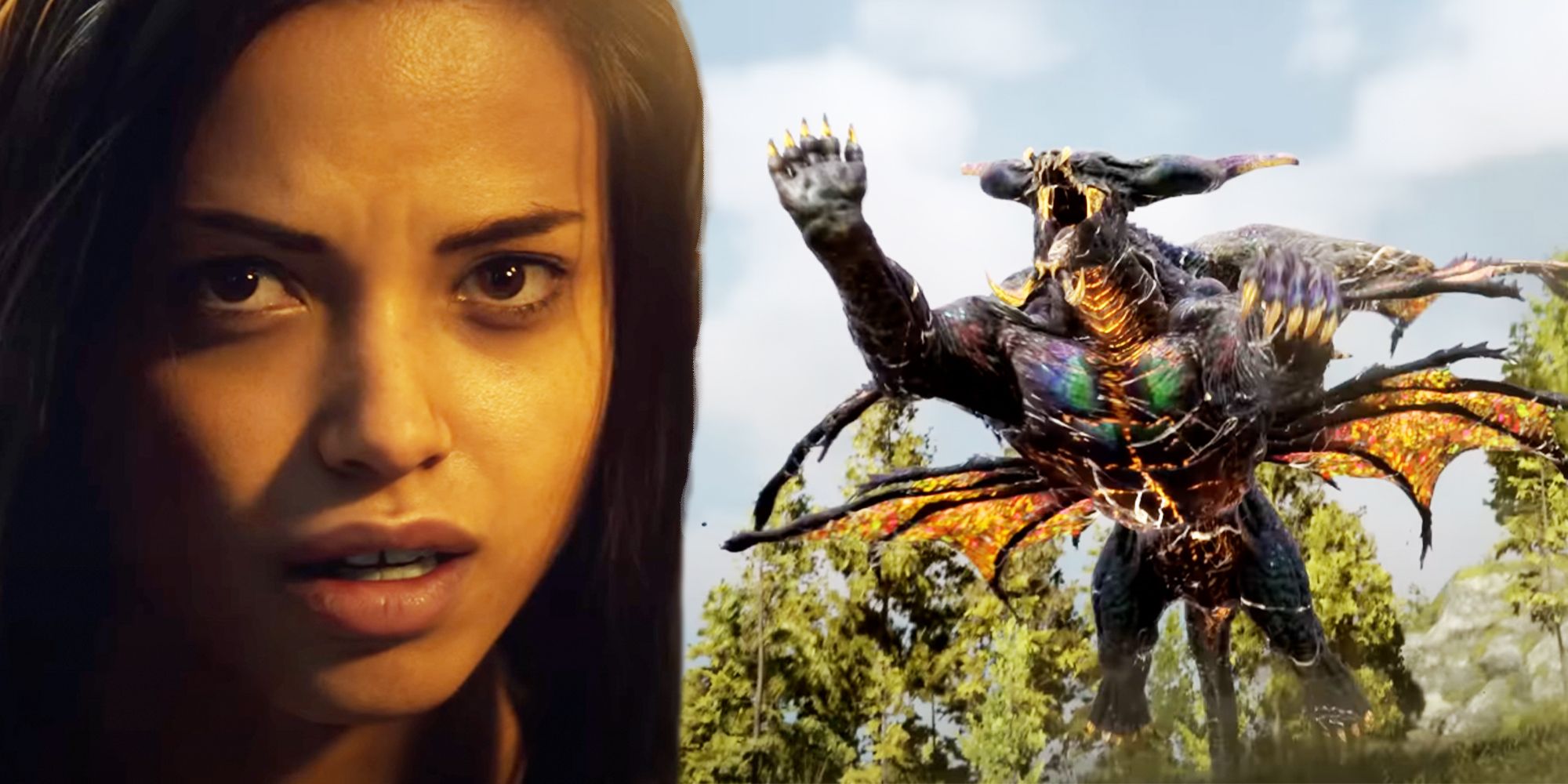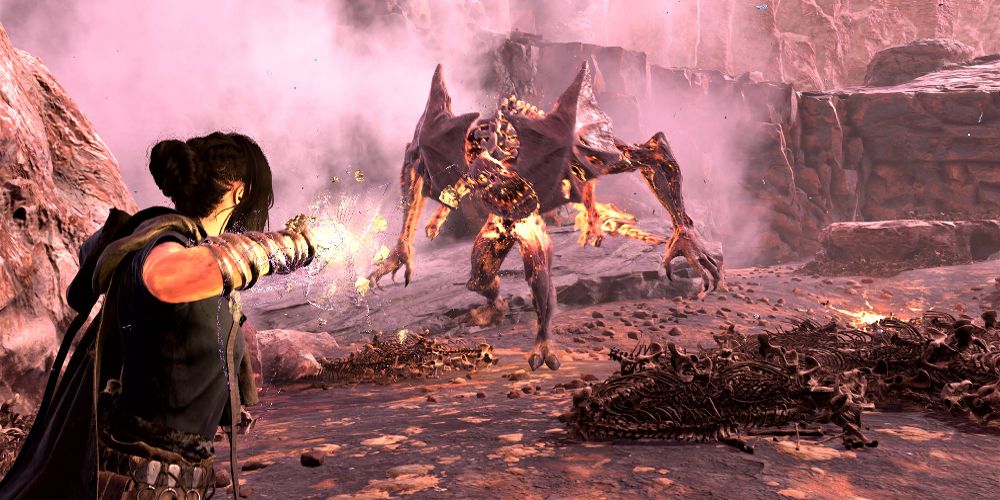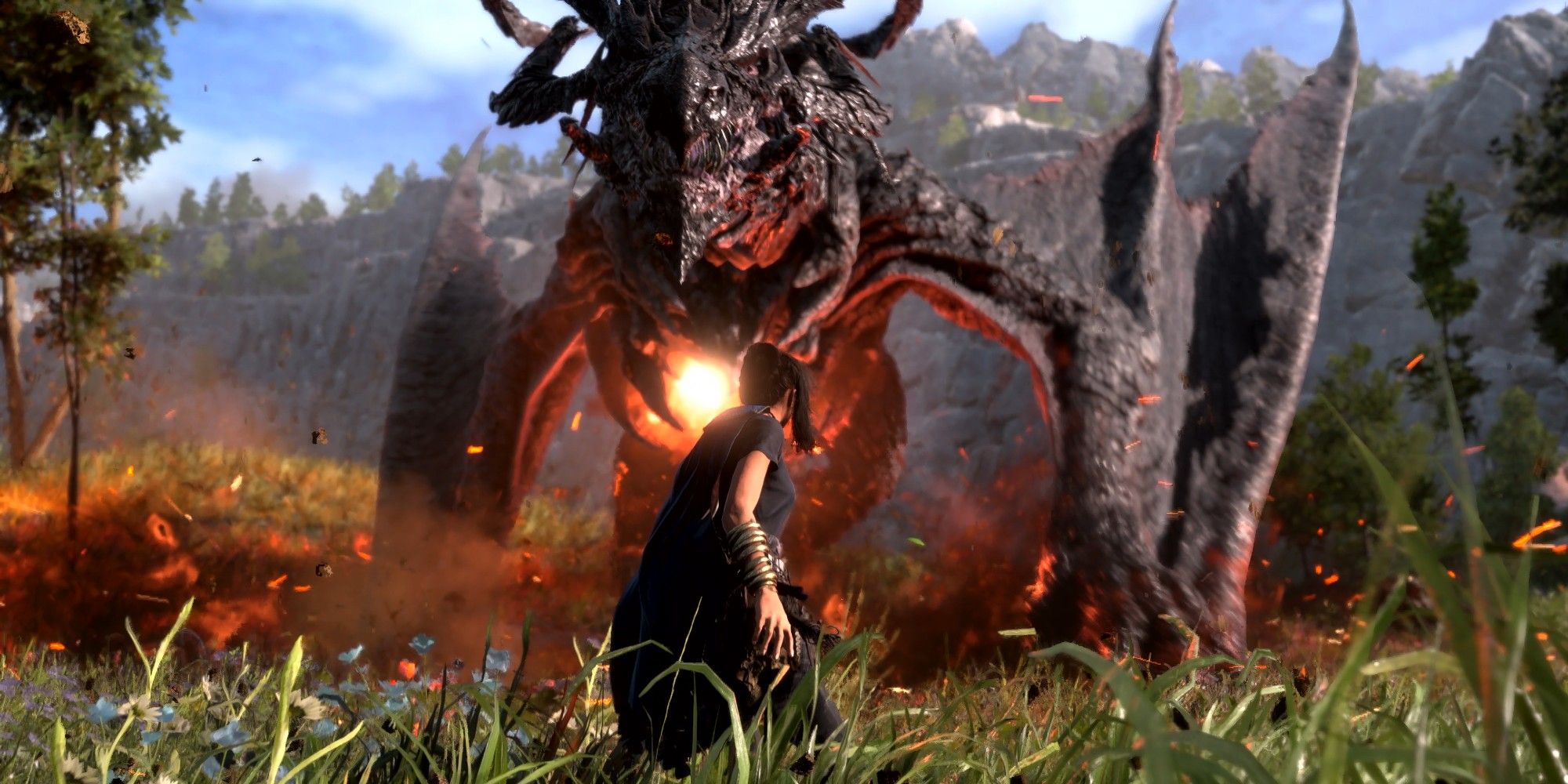Forspoken, the next game to be published by industry juggernaut Square Enix, is nearing release. Developed by Luminous Productions, this action RPG tells the story of Frey, a young New Yorker who is transported to a different, and dangerous, land. Forspoken made waves when it was first announced in 2021 thanks in part to its exciting-looking player skills, promise of open-world gameplay, and unique enemy designs.
The high pedigree of the creative minds behind Forspoken extends to the game's composers. The music of Forspoken was co-composed by Garry Schyman and Bear McCreary, each a celebrated film and game scorer in his own right. McCreary is well-known to television audiences thanks in part to his work on AMC's The Walking Dead and, more recently, Amazon's The Rings of Power, while Schyman has created arguably some of the most iconic video game music of all time with his work on the BioShock and Middle-earth franchises. Together, Schyman and McCreary crafted a lush, tonal score which they executed with the help of vocalist India Carney.
Garry Schyman spoke with Screen Rant about the tone of his music for Forspoken and his love of orchestral scoring.
Garry Schyman on Forspoken
Screen Rant: When you're thinking of taking on a project, what is generally the thing that attracts you? The story, the world, the tone, or something else?
Garry Schyman: What interests me creatively, obviously, is the project itself. It can truly make it from a routine project to something really special. I've done routine projects, and they're far less interesting. I'm happy to do them sometimes, especially if I'm not busy with something else, but when something special comes up like a BioShock, Dante's Inferno, Shadow of Mordor, [or] Forspoken, these are really amazing opportunities creatively. [They] often involve writing music where there [are] melodies, and there's harmony, and there's traditional composition. That's what I grew up loving - writing traditional music. There's a lot of sound design, and it's amazing, some of it's so effective, but that's not what I'm particularly interested in. I've used sound design; for the right cue, it's perfect, but if the project has at least some opportunity to write real music, that's huge.
Then, of course, [I'm drawn to something] if it's inspiring. Some projects are less inspiring than others, and some are super inspiring; [they're] almost a huge challenge, and a little scary. BioShock was that. It was kind of intimidating, although I did not anticipate BioShock being a huge success. No one had ever heard of BioShock. It wasn't like I was doing God of War or some project that has all these high expectations. It was kind of a project that could go either way; it could have been a small success or, as it turned out to be, a huge success.
Was there a sense of pressure going into Forspoken, then, because Square Enix is such a huge company and it's a high-profile project?
Garry Schyman: To some extent. I remember writing the first cue I wrote for them; it was a combat cue. The first one I wrote for them was not the right approach. They were not happy with it. It was a good cue, but it was the wrong approach. I focused in on some of their concerns, and I said, "Okay, I think I get it," I wrote the second version of that, and they really were happy with it. That set us off in a good direction. It's always that first cue, the first thematic thing you do, that really is the test of, "How quickly am I going to get this?" The challenge is getting it - finding the unique thing that score needs to underscore this particular project, whether it's a film, or TV show, or a game.
What was that first road that you went down, and how did you land on the tone you ended up finding for Forspoken?
Garry Schyman: They wanted it to be more tonal. I had produced some very intense combat, and they wanted it more tonal, and more fantasy. I immediately got that, but I wanted to keep something unique about it, so I made it "edgy tonal". Let's put it that way. You'll hear some of the cues, and they're very tonal. There were some nice opportunities to write some beautiful music for this game, which is always wonderful. If I had to delineate the type of music in a lot of video games that I've written, they can be dark, and scary, and eerie, and suspenseful, but beautiful is not always the opportunity you get. In this game I had a really nice opportunity to write tonal, beautiful, sensitive, emotional, music. That was lovely.
There is a great use of female vocals in the score. Did that decision come from wanting to mirror the main character of the game?
Garry Schyman: Yeah, the main character Frey definitely was an inspiration. Bear McCreary and I found India Carney, and she was wonderful. She has [a] beautiful voice. We recorded with her for a good part of a day, just her solo over some of the cues that already had been recorded with live orchestra. I gave her parts to sing, but also, she improvised, and she was wonderful to work with. She loved it too; she said, at the end of the day, "This was one of my favorite recording sessions ever." I said, "Well, fantastic. Mine, too, because you were great." She was very easy to work with, [and] got it very quickly.
We [also] had a choir, of course, that was more just to give it that big epic fantasy vibe. It was great to have the choir, and of course, orchestra. Synthesizers were part of it, and some unique instruments. Some viola d'amore that was used, and some other sort of primitive instruments all sort of made this soup, this complex, interesting mixture of things that created the score.
This is a nerdy question, but when you go to those kinds of instruments, do you record the orchestra first and then find soloists to work with separately?
Garry Schyman: Usually, they're overdubs that are recorded separately. That way, you can control them completely. You can have them improvise and experiment, and then [go], "Okay, that take didn't work. Let's try something else." And something else is, "Yeah, that is it, that's really cool. You found it." Almost always, if there is an important solo part, and it is an unusual solo instrument, primitive instrument, or some unique created instrument, I like to record them separately, assuming there's the time and the budget to do so.
You worked with Bear McCreary on this. You both have done a number of your own games, so what brought you together, and what was your collaboration like?
Garry Schyman: Luminous Games, which is owned by Square Enix, reached out to my agent at the time, and Barry and I were [then] both with Kraft-Engel. They were interested in both of us, [but] not necessarily as a team. Serendipitously, I've known Bear for a while, and we are very good friends. We had been at GDC the prior year and had breakfast together, and in the conversation, I said, "What if we did some project together? Wouldn't that be cool?" and he said, "Yes, that would be really cool."
When this came up, my agent said, "What if you guys do this together?" We both said, "Yeah, that'd be great." Bear didn't have the bandwidth to do the entire score anyway, so it had that benefit too. They thought it was a great idea, and that's how it got started. Bear and I were having meetings together, and meeting with them, and talking about the approach to the game, getting artwork, and early gameplay, et cetera. So, that's how it happened.
In my mind, thanks to BioShock and your other work, you are one of the composers who really helped video game music become acknowledged in the same way as film scores. Do you have any thoughts on the state of video game music now, or is there anything happening in the industry that you're excited about?
Garry Schyman: Thank you. That's a very big compliment, and I appreciate it very much. I don't know if it's true or not, but I hope it is. When BioShock came out, my score was pretty unique; I will say that. I don't know if I contributed to this, but I'd like to think I did: there was this article in The New York Times, like, "Are video games art now?" because of BioShock. I think maybe I contributed a little bit to that conversation. I've always tried to bring my best game - no pun intended - to the table, and do the best job I can, and I have my own sort of unique sound and sophistication.
[As for] the state of it now, I think it's all over the map. We're living in a very interesting time. For film, TV, [and] games, it's like anything is possible now. That said, there are still a lot of orchestral scores. People keep saying orchestral scores are going to go away, and yet, I don't know. There's something universal about the orchestra. It's so ubiquitous for so many decades, and we have John Williams and Hans Zimmer, and all these scores that either are purely orchestral or orchestral with synths and samples, et cetera. It still speaks to us, and is in some ways a great approach for a score. I grew up loving orchestral music, [and] writing orchestral music. That's where I'm at, and if they decided to get rid of orchestral scores for games and go purely on sound design, I think I would lose interest in scoring. That's just me, but I think I'd just focus on my garden or something. I don't have a garden, but I'll start a garden.
I would say right now is a really good time to be a composer. There's more stuff to score now than ever. There's so much television with Amazon Prime, and Netflix, and all these different streaming channels. There's just so much that needs music now, and of course games and feature films are still around. There's a lot of cool stuff going on. If you're asking me to name one particular score that stands out to me... I like Bear's stuff. I think he did a great job on the [The Rings of Power]. It's really cool; it's a really wonderful score.
About Forspoken
Forspoken is an upcoming action RPG from Luminous Productions, published by Square Enix. Forspoken follows the journey of a young New Yorker named Frey at the end of her rope, transported to a beautiful, fantastical, and cruel land. In search of a way home, she uses her newfound magical abilities to traverse sprawling landscapes and battle monstrous creatures. Music for Forspoken was co-composed by Garry Schyman and Bear McCreary.
For more, check out our Forspoken developer interview.
Forspoken will release on PlayStation 5 and PC on January 24.



